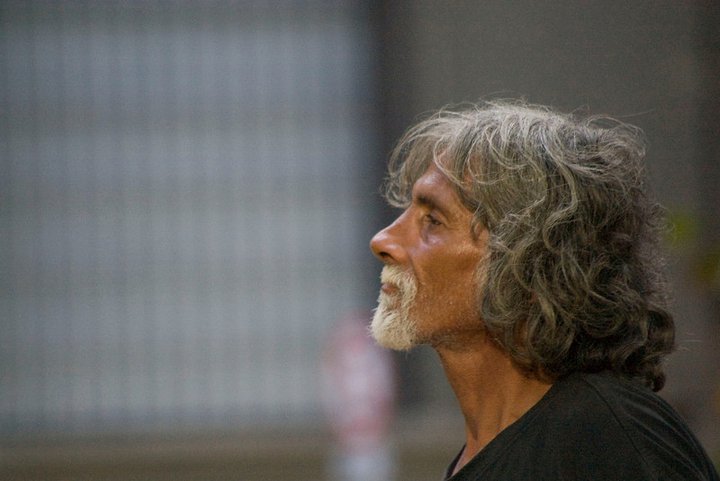On my way Uptown after dancing all
afternoon on Frenchman, I take Esplanade
to bypass the interstate and avoid running
the gauntlet of unsavory intersections
along Claiborne.
I pull up to the red light under the overpass
where sits an old beggar in the middle
of the neutral ground on a milk crate
cushioned by newspapers and
surrounded by the paraphernalia
of the homeless.
Since the lanes have narrowed from two
to one and there are no cars ahead of me,
I have no choice but to come to a stop right
beside him and the sign advertising his plight..
I ease my car just beyond his line of sight
so that I can evade eye contact;
but I can’t pretend he’s not there.
I don’t really want to yield to his need.
I tell myself that there are so many
like him and so many reasons for
not giving on the street.
So, when he glances in my direction, I look the
other way until he turns his attention elsewhere,
appearing not to care about the state of my soul
or whether I intend to do anything about
his predicament.
The absence of a direct encounter
creates a void that frees me to reconsider
his situation and my own.
Then, without the pressure to act in one way
or another, the differences between us
seem to drop away.
And, before the light can change, I hurry to
pull a bill from my wallet. I know it won’t
be enough to buy much, but I feel compelled
to reach out and connect in some way.
I open my window, hold out a five,
and say, “May I offer this to you?”
He turns back to me and takes the bill with two fingers,
careful not to touch my hand, as if to protect me
from the taint of the street. Then he offers me
a simple “thank you” just as the light changes.
Later I find myself wishing it had been a twenty.

 NOLAbeings Multimedia artist Claire Bangser created NOLAbeings as a portrait-based story project that marries...
NOLAbeings Multimedia artist Claire Bangser created NOLAbeings as a portrait-based story project that marries...  Voodoo in New Orleans: Reviving history: New Orleans fortune telling This article takes a deep dive into the history of Voodoo in New Orleans, its hybridization with Catholicism, and its present-day place in the city's culture. The author visits fortune-tellers in the French Quarter, using their guidance as a tool for introspection rather than a deterministic predictor of the future. Through her experiences in New Orleans, the author feels a mystical connection to both the past and the future.
Voodoo in New Orleans: Reviving history: New Orleans fortune telling This article takes a deep dive into the history of Voodoo in New Orleans, its hybridization with Catholicism, and its present-day place in the city's culture. The author visits fortune-tellers in the French Quarter, using their guidance as a tool for introspection rather than a deterministic predictor of the future. Through her experiences in New Orleans, the author feels a mystical connection to both the past and the future. 